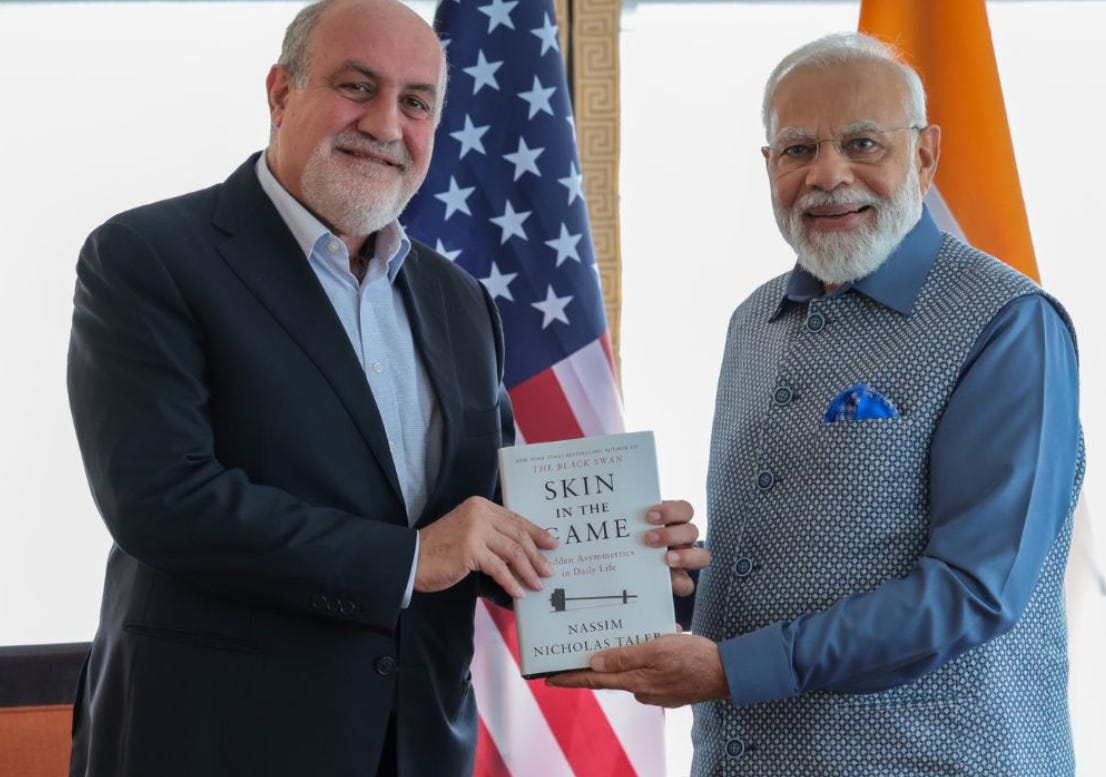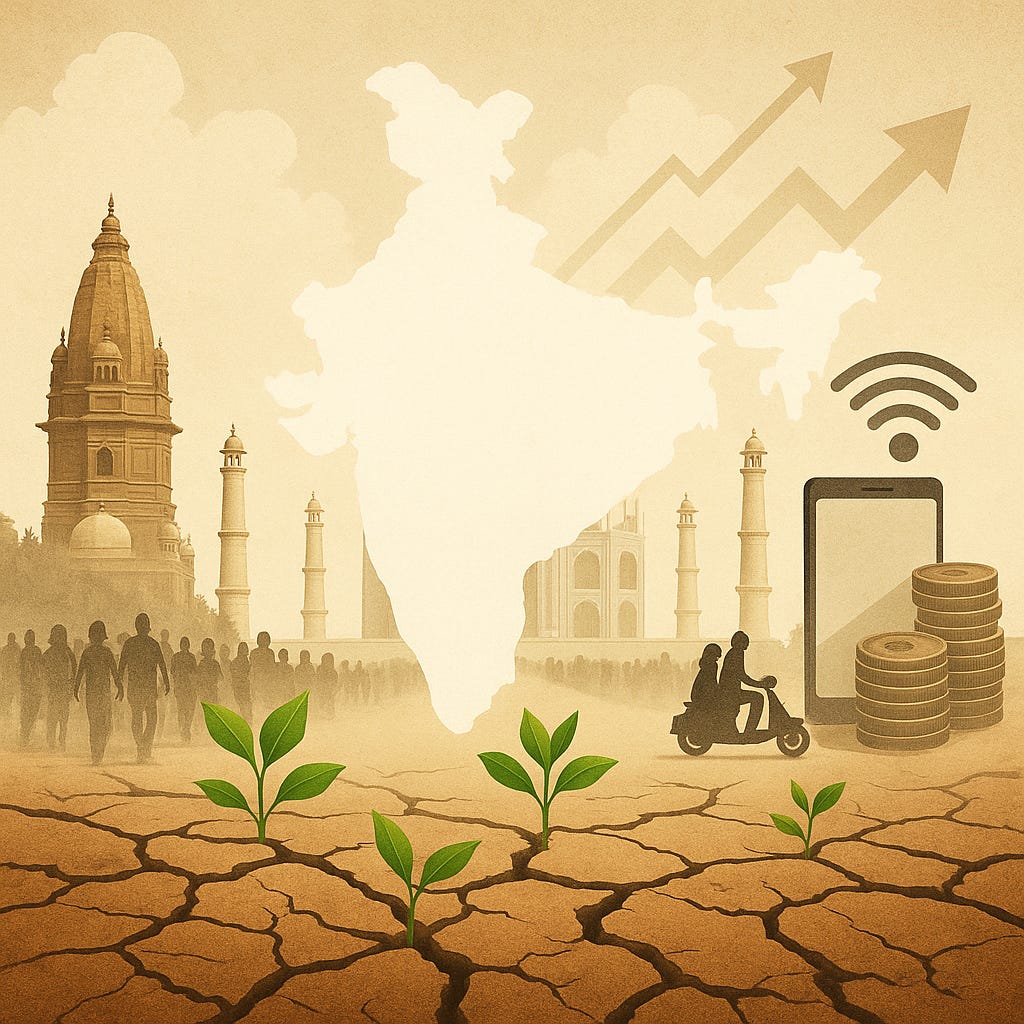Anti-Fragile India!
C.S. Lewis once observed, some truths must be retold again and again. India must remember kṣama-forgivenes which made it, perhaps, the most anti-fragile society on the face of this planet.
As India negotiates a turbulent global environment marked by geopolitical shocks, supply chain realignments, climate crises, and technological disruption, there is an understandable tendency to get anxious. The world appears brittle—fracturing under pressure, growing more polarized, and becoming less predictable by the day.
But India should not panic. In fact, there is a strong case to be made that India might be the most anti-fragile country in the world today.
To be clear, “anti-fragile” is not the same as resilient or robust. Borrowing from Nassim Nicholas Taleb, an anti-fragile system doesn’t merely survive shocks—it gets stronger because of them. It feeds on volatility, improvises under constraint, and grows through failure.
And that may be the truest description of India today.
A Civilizational Habit of Absorbing Shocks
Empires have come and gone. Borders have been redrawn. Famines, colonialism, and partition have scarred India’s body politic. And yet, the Indian civilizational mind has persisted—curious, layered, open-ended.
There is something deeper at work here than mere endurance. India’s ability to bounce back rests not on material strength or institutional order alone, but on something far more fundamental: a cultural commitment to forgiveness—kṣamā.
As ancient Indian rishis reminded us, “This too shall pass.” The Indian psyche, when it leans into its civilizational wisdom, knows how to let go. This letting go—of ego, vengeance, perfection, and control—is what allows space for creativity, risk-taking, and long-term renewal.
Forgiveness, far from being passive, became a force multiplier: It enabled diversity, minimized cycles of vendetta, and made it easier to adapt. When failure was not final and redemption was always possible, Indians dared—to create, to experiment, to rebuild.
India's Anti-Fragility in the 21st Century
India’s current landscape is messy. But that mess is not a liability—it’s a generative field. Consider:
🔹 Civilizational Continuity
From the Vedas to the Constitution, from Bhāgavata Purāṇa to Bollywood, India carries forward a complex but coherent cultural DNA. It doesn’t discard—it accretes.
🔹 Demographic Chaos = Creative Fertility
A billion-plus people across hundreds of identities—and yet, the country buzzes with jugaad, micro-innovation, and entrepreneurial energy. Complexity is not frozen; it is fluid.
🔹 Layered Governance
India operates through formal institutions and informal networks—courts and panchayats, WhatsApp groups and community elders. When one channel fails, others adapt. Redundancy is a feature, not a bug.
🔹 Comfort with Contradiction
Vedānta spoke of unity in multiplicity; Nāgārjuna of emptiness and interdependence. Indian thought doesn’t fear paradox—it thrives in it. This allows the average Indian to hold contradictory beliefs without imploding.
🔹 Rebirth Over Collapse
Indian narratives rarely end in apocalypse. They end in rebirth. Failure is not terminal—it is a passage. Whether in religion, politics, or personal life, India resets rather than breaks.
🔹 Informal Economy as Shock Absorber
The informal sector, often derided, has been a shock sponge during disruptions—from demonetization to COVID lockdowns. People reconfigure roles with remarkable agility.
🔹 Digital Leapfrogging
Aadhaar, UPI, and ONDC emerged in a landscape riddled with infrastructural and bureaucratic potholes. And yet, India has quietly built one of the most inclusive digital public stacks in the world.
The Price of Anti-Fragility
This is not to romanticize dysfunction. Anti-fragility comes at a cost. The burden of chaos is disproportionately borne by the poor, the informal, and the unrepresented. Forgiveness, when coerced, can become fatalism.
But India’s anti-fragility doesn’t mean accepting the status quo. It means recognizing the unique opportunity to channel our disorder into design. To scaffold innovation atop diversity. To transform contradiction into collective wisdom.
A New Script for the World?
In an age where many nations are collapsing under their own rigidities—struggling with immigration, polarization, institutional brittleness—India offers a different script:
Endure. Adapt. Regenerate. Dance with chaos.
In a world obsessed with efficiency, predictability, and control, perhaps India’s greatest strength is that it thrives despite those ideals—and sometimes, because it has rejected them.
India doesn’t need to be afraid of shocks. It has already built a civilizational logic that knows what to do with them.
The world is fragile. India doesn’t have to be. Without re-creating an India where failure is no longer punitive—if not celebrated—the country will find it difficult to internalize the rules and norms that shape the world.
[….TO BE CONTINUED]
********
Disclaimer: The opinions and thoughts expressed here reflect only my personal views and not of the institution where I work.
Nothing I have written here is set in stone. I am putting these ideas to start a conversation and bring people to discuss and debate the issues captured here. Give me feedback, and it will help me learn.



